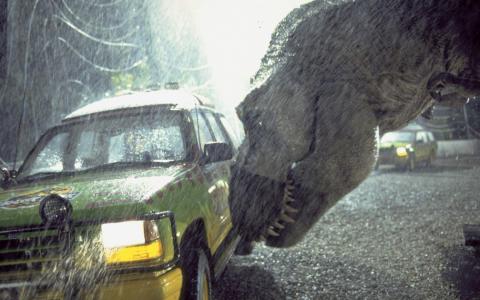The Anxiety and Awe of JURASSIC PARK

JURASSIC PARK
This essay on Jurassic Park (1993) was written by JJ Bersch, PhD candidate in UW Madison’s Department of Communication Arts. A 35mm print of Jurassic Park will conclude our Sunday Cinematheque at the Chazen series saluting the Music of John Williams on May 7 at 2 p.m. at the Chazen Museum of Art.
By JJ Bersch
There is one video on the Internet that is better than all of the other videos on the Internet. Uploaded by a mysterious user named P. Lo, its title is pleasingly simple and descriptive: “Jurassic Park Theme Song (Melodica Cover).” Mr. Lo opens the video with unaltered footage from one of said film’s earliest and most iconic scenes. Park founder John Hammond (Richard Attenborough) rises from the ground to gaze adoringly into an immaculate field as Dr. Alan Grant (Sam Neill) and Dr. Ellie Sattler (Laura Dern) slowly realize the majesty unfolding before their eyes. Perhaps the most famous instance of the patented “Spielberg face” mobile close-up follows as Grant dramatically turns his attention from prehistoric grass towards the marvelous beasts roaming the park’s grounds. In director Steven Spielberg’s film, this majestic moment is met with majestic music: the strings swell, the unmistakable theme kicks in; in P. Lo’s video, this majestic moment is met with an entirely less majestic melodica: the strings swell, the unmistakable theme kicks in, poorly, awfully, embarrassingly. Funny as it is, the melodica is wisely not the only punchline, as composer John Williams’s score returns in the video’s final moments to back Grant’s amazed remark of “They do move in herds.” I have never seen someone avoid laughing at this video. I believe it is impossible.
The video capitalizes on something that is very obvious to us now: John Williams’s score for Jurassic Park is really the only score there ever could have been for Jurassic Park. Williams, as you have learned if you have followed this series this semester (or followed American cinema for any of the past fifty years), is a composer who loves a good theme (or seven). From Jaws, Star Wars, Superman, Indiana Jones, and E.T. to more recent additions to the theme canon like Harry Potter and the film in question today, Williams has created many of the most eminently recognizable themes in film history. To his most ardent detractors, this is said to be all of which he is capable, but as this series has shown, such Williams scores as the jazzy looseness of Catch Me If You Can or the pop perfection and madness of The Long Goodbye showcase a much more varied composer. But, even with that in mind, if we are being totally honest with ourselves, when we see the name John Williams pop up on a film’s opening credits, we are probably anticipating the theme most of all. In Jurassic Park, that theme is monumental, perhaps a bit slower than you remember, triumphant but a little bit wistful, too. It matches the scale of the dinosaurs but also the scale of Hammond’s misstep. It is spectacle and sadness. When I heard the theme played at my wife’s college graduation, it felt perfectly apt; what else could match that sense of achievement and loss?
Beyond the Williams score, Jurassic Park is packed to the (dino) gills with entertainment. It was my favorite movie at the age of 3, and it is easy to see why: dinosaurs. It contains some of Steven Spielberg’s very best set pieces: the first altercation with the Tyrannosaurus, the power outage sequence (“clever, girl”), the RAPTORS IN THE KITCHEN. Considering Spielberg’s Raiders of the Lost Ark contains at least three of Cinema’s very best set pieces, this says quite a bit. Jurassic Park is a film that knows that spectacle matters most when you match it with scares, and that those two words do not mean anything if you do not first define the geography of a space. It is one of the last times a Spielberg movie featured children you did not instantly want expunged from the screenplay. It features maybe the best Samuel L. Jackson catchphrase that does not feature a curse word (“Hold onto your butts.”) as well as Wayne Knight turning in a performance that is improbably and incredibly more annoying than Seinfeld’s Newman. It gave us those glorious, glorious, glorious shots of a shirtless Jeff Goldblum (so glorious, in fact, that it made the studio think Goldblum could carry the next film himself).
A couple of years ago, the series made a financially successful return with Colin Trevorrow’s Jurassic World, but that film, for all of its merits, could not solve the problem that has haunted all of the series’s entries after the first: how could you possibly match the hubris and bravado it took to make Jurassic Park, and make it feel authentic at that? This is perhaps no truer anywhere else than the play between Williams’s score and the images on screen, perfectly paired to create a breathtaking sensation matched by nearly no other film in blockbuster history. Sure, life finds a way of doing most things, but it has not found a way to replicate the delightful concoction of anxiety and awe that is Jurassic Park.
